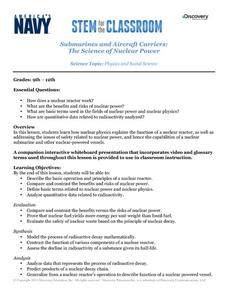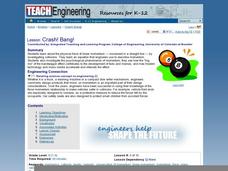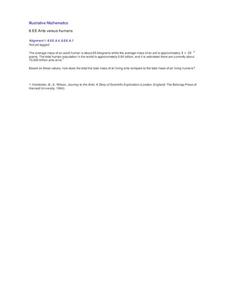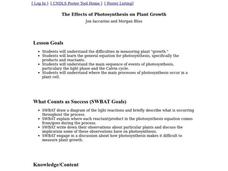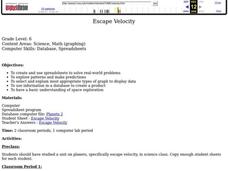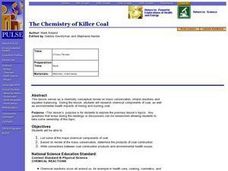Curated OER
Regular Coke vs. Diet Coke: Which is Denser?
Learners define the terms "mass," "volume," and "density." The relationship between these three terms is established. They observe the differences between Regular and Diet Coke. They develop an hypotheses about why a can of Regular Coke...
Curated OER
Stoichiometry
In this stoichiometry worksheet, high schoolers solve thirty problems using the process of stoichiometry to find moles, molecules, and masses of substances in chemical reactions. Students balance chemical equations, find limiting...
Curated OER
Comparison of Protein Sequences From Two Samples of Crabmeat Using Gel Electrophoresis As an Introduction To the Biotechnology Lab
Students discover that proteins that are the product of DNA translation are different for different species. They determine that by analyzing their mass and charge they can differentiate between two different species. They use some of...
Institute of Electrical and Electronics Engineers
Ship the Chip
Here is a tasty challenge, especially for middle school engineers: design a container that meets mass and volume criteria, and will safely transport a tortilla or potato chip through the mail without damaging it! Mostly, this is a crisp...
Consortium for Ocean Science Exploration and Engagement (COSEE)
Ocean Acidification: Whats and Hows
Open this activity by demonstrating the production of acidic carbon dioxide gas by activated yeast. Emerging ecologists then experiment with seashells to discover the effect of ocean acidification on shelled marine organisms. They...
Discovery Education
Submarines and Aircraft Carriers: The Science of Nuclear Power
As physics masters view this presentation, they learn how nuclear power is used in submarines. They use Google Maps to plot a course through the ocean and calculate the time required for surfacing and traveling. They learn about fission,...
Dick Blick Art Materials
Pop Art Clay Portraits
Create the classic Andy Warhol mass-produced image using clay slabs. Explore the pop art movement using image transfer techniques. This project incorporates art history as well as multiple clay tools. The finished product is an...
Winston-Salem Forsych County Schools
Economics Worksheet Economic Systems and Circular Flow
Agribusiness, human capital, productivity. Find out what your class members know about economic systems and terminology with this two-page economics worksheet that that asks kids to identify terms and concepts.
Curated OER
On the Line
High schoolers view a television program that traces the use of the assembly line in mass production and the subsequent conflict between workers' rights and management. They analyze and discuss the portrayal of the American worker over...
Curated OER
Nuclear Decay
In this nuclear decay activity, students read about alpha and beta decay and the isotopes formed by the reactions. Students solve nine problems including writing the equations for the decay of radioactive isotopes, identifying the...
Curated OER
Go Car, Go!
Students design and build their own car. In this physics lesson, students collect data to determine the speed of the car. They plot the data on the graph analyze the relationship between variables.
Curated OER
Crash! Bang!
Young scholars study the physical force of linear momentum by investigating collisions. They analyze the difference between elastic and inelastic collisions. They calculate linear momentum.
Virginia Department of Education
Finding the Formula and Percent Composition
Do you have mole problems? If so, call Avogadro at 602-2140. The lesson plan starts with pupils working independently to solve for molar mass of ionic compounds. Then they learn to solve for percent composition and later perform an...
Illustrative Mathematics
Ants Versus Humans
You would think that humans make up more mass than ants do on this planet, but think again, and this time by performing calculations. Middle schoolers use scientific notation to compute and compare the estimated total mass of all humans...
Curated OER
Condensation Polymerization: Preparation of Nylon 6/6
Students participate in a lab activity in which they synthesize nylon 6/6, calculate the percent yield by mass, identify the polymer as thermoplastic or thermoset, and determine the melting point, density and end-product use of the polymer.
Cornell University
Thin Films
Combine mathematics and science to calculate measurements of unmeasurable materials. Individuals use knowledge of density and volume to determine the thickness of the film used in production. They also apply stoichiometry to determine...
Curated OER
The Effects of Photosynthesis on Plant Growth
High schoolers are able to draw a diagram of the light reactions and briefly describe what is occurring throughout the process. They are able to explain where each reactant/product in the photosynthesis equation comes from/goes during...
Curated OER
Types of Reactions
In this reactions worksheet, students complete the given reactions by writing the products. Students do examples of composition, decomposition, single replacement, double replacement, and combustion reactions. This worksheet has 54...
Curated OER
Escape Velocity
Sixth graders create/use spreadsheets to solve real-world problems, explore patterns, make predictions, select/explain most appropriate types of graph to display data, use information to create product, and have basic understanding of...
Curated OER
Energy and Matter
A review of a full unit on energy and matter, this slide show starts with basic definitions of states of matter and their mass. It then develops the ideas of the forces that that matter can exert. Details about bonding within matter and...
Redefining Progress
Have and Have-Not
Is there a correlation between a country's wealth and the extent of its ecological footprint? What exactly constitutes an ecological footprint, and how does one country stack up against the rest? This is a unique instructional activity...
Sharp School
Travel Brochure Project
Designing a travel brochure is a classic project that will help your class members develop a variety of skills, such as researching informational texts, designing creative visual products, and communicating what you have learned.
Brigham Young University
Understanding Design, Composition, and Color
The set for a play combines design elements (style, line, shape, mass, measure, position, color, and texture) and principles of composition (unity, harmony, contrast, variation, balance, proportion, and emphasis) to create a particular...
Curated OER
The Chemistry of Killer Coal
Students research chemical components of coal, as well as environmental health impacts of mining and burning coal. They discuss conservation of mass as it relates to combustion of organic compounds.
Other popular searches
- Early Mass Production
- Mass Production Food
- Simulation Mass Production
- Industry Mass Production
- 1920s Mass Production
- Mass Production Simulation
- Graphing Mass Production
- Product Mass Production







